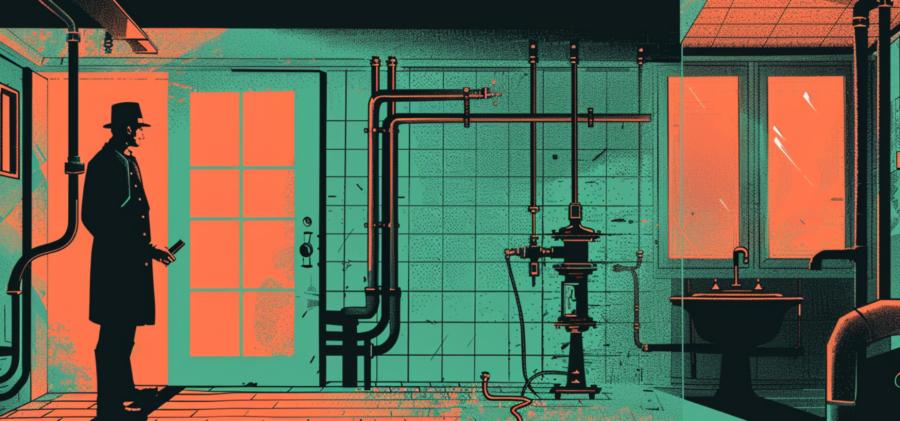Leaky Faucets: The Office Drip Orchestra
Imagine sitting in a meeting, and all you can hear is the relentless drip, drip, drip from the bathroom down the hall. Leaky faucets are not just annoying; they can waste gallons of water and skyrocket utility bills.Detective Tip: Check for water pooling around the base of the faucet or in the sink overnight. If the drips persist, it might be time to replace the washer or the entire fixture. Don’t let a small leak lead to a big bill.
Silent Toilet Leaks: The Phantom Menace
Toilets that run intermittently can haunt your plumbing system, causing a spike in water usage without anyone noticing. This silent leak can be sneaky, often due to a worn-out flapper or a malfunctioning fill valve.Detective Tip: Add a few drops of food coloring to the toilet tank. If the color appears in the bowl without flushing, you’ve got a leak. It’s an easy fix—usually just a matter of replacing the flapper. Don’t let the phantom menace go unchecked.
Clogged Drains: The Slow-Mo Horror Show
A slow-draining sink is like a horror movie in slow motion. The water creeps up, threatening to overflow, and no one knows who—or what—will stop it. Clogs often result from a buildup of hair, soap, and other debris in the pipes.Detective Tip: Regularly clean out strainers and stoppers. If the water still drains slowly, try using a plunger or a plumber’s snake to clear the blockage. For persistent clogs, it’s time to bring in the professionals.
Water Pressure Woes: The Office Shower Blues
Low water pressure can turn the simple task of washing your hands into a tedious chore. This issue can stem from several sources, including pipe corrosion, leaks, or a malfunctioning pressure regulator.Detective Tip: Check multiple fixtures to determine if the low pressure is isolated or widespread. If it’s an isolated issue, cleaning the aerator might help. For office-wide problems, it’s best to consult a plumber to diagnose and fix the underlying issue.
Water Heater Problems: The Chilly Reception
There’s nothing worse than cold water in the office bathroom, especially when everyone’s expecting a warm welcome. Water heater issues can range from a lack of hot water to strange noises coming from the unit.Detective Tip: Check the thermostat settings and inspect for leaks around the unit. Sediment buildup can also cause inefficiencies, so regular maintenance and flushing the tank can extend its life. If the heater is old or the issues persist, it might be time to consider a replacement.
Burst Pipes: The Office Niagara Falls
Few things spell disaster more clearly than a burst pipe in the office. Freezing temperatures or corrosion can lead to this dramatic plumbing failure, causing extensive water damage and disrupting business operations.Detective Tip: Insulate exposed pipes and keep the office heated during cold weather. Look for signs of rust or leaks and address them promptly. In case of a burst pipe, shut off the water supply immediately and call a plumber.
Strange Noises: The Ghosts in the Pipes
If your office plumbing sounds like a haunted house, with bangs, gurgles, and whistles, it’s time to investigate. These noises often indicate air in the pipes, loose fittings, or even water hammer.Detective Tip: Listen carefully to identify the type of noise and its location. Tighten any loose pipe straps and consider installing water hammer arrestors. If the noises persist, a professional inspection may be necessary to prevent further damage.
Sewage Smells: The Office Odor Offender
A foul smell wafting through the office can be more than just yesterday’s lunch gone wrong. It could indicate a serious plumbing problem, such as a broken sewer line or a clogged vent pipe.Detective Tip: Check for dry P-traps by running water in seldom-used sinks. If the smell persists, it could be a more significant issue requiring professional attention. Addressing the problem promptly will keep your office air fresh and your employees happy.
Mold and Mildew: The Unwanted Office Decor
Mold and mildew are not just unsightly; they can pose health risks and indicate hidden leaks or excessive moisture. Spotting these early can prevent larger, more costly problems down the line.Detective Tip: Regularly inspect areas around sinks, ceilings, and under cabinets for signs of mold. Ensure proper ventilation in bathrooms and repair any leaks immediately. Sometimes, it’s best to call in a professional to handle extensive mold removal safely.
Unexplained Water Bills: The Financial Leak
If your office water bill suddenly spikes without a corresponding increase in usage, you might have an unseen leak. This hidden menace can lead to significant water waste and inflated bills.Detective Tip: Monitor your water meter for any unusual activity. Turn off all water sources and check the meter after a few hours. If it’s still moving, you likely have a leak. Finding and fixing the source promptly can save money and prevent further damage.
Wrapping Up
Being the plumbing detective of your office isn’t about wearing a trench coat and carrying a magnifying glass—though that would add some flair to your role. It’s about being vigilant, proactive, and knowing when to call in the experts. Regular maintenance and early detection can keep your plumbing system running smoothly and prevent those little problems from becoming full-blown disasters. So, keep your eyes and ears open, and remember: a little detective work goes a long way in maintaining a happy, dry, and efficient office environment.Article kindly provided by atlasltdgas.com


